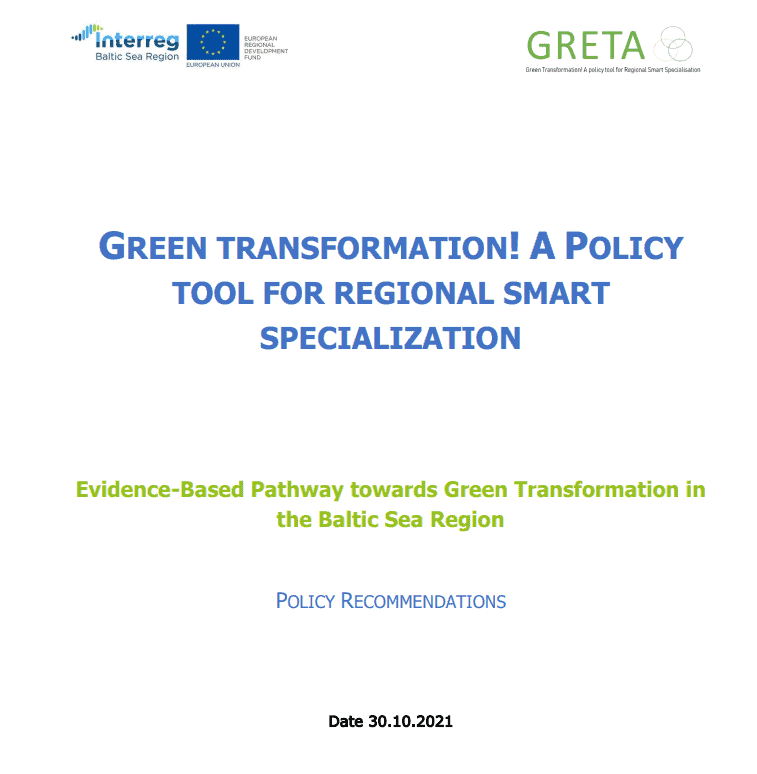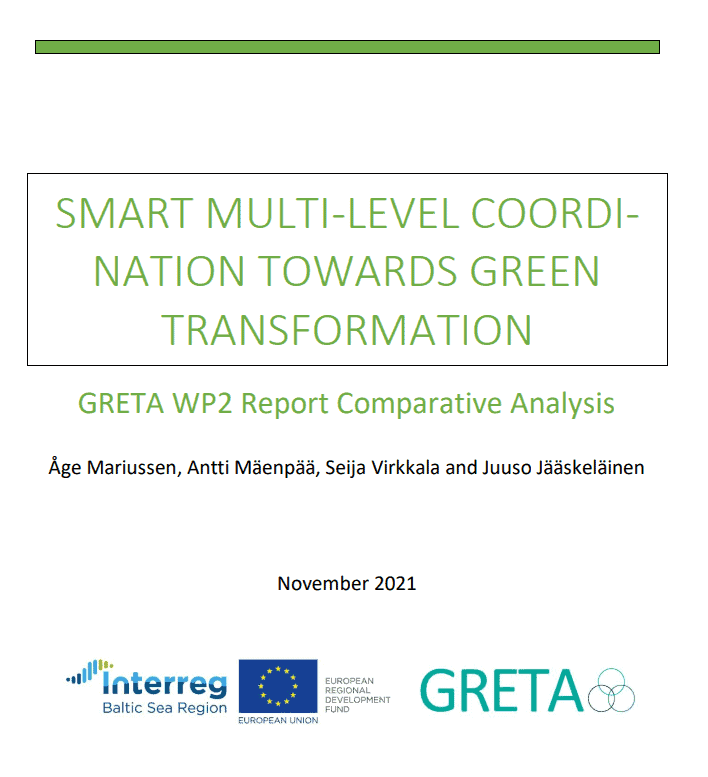GRETA
The challenge
The global value chains and increased sophistication of production constitute a large challenge for regional development efforts. There is a need to learn and upgrade the level of policy intervention. The regional innovation systems are different but may learn from each other through a process of transnational learning. The challenge is to identify and close gaps in regional and transnational systems of innovation.
Need for an upgrade
GRETA built on experiences with methods to support growth developed in the LARS project with environmental targets in two areas: energy (reduction of CO2 emissions, green energy production) and circular economy.
Budgets
in numbers
-
0.40MillionTotal
-
0.31MillionErdf
-
0.00MillionEni + Russia
-
0.00MillionNorway
Achievements
GRETA built on experiences from the LARS project on how to help public authorities drive smart specialisation processes in their regions and tackle the fragmentation of regional ecosystems, thus supporting growth in the Baltic Sea region. In LARS, methods to identify, analyse and overcome challenges limiting growth were developed. The challenge for GRETA was to add an environmental aspect to the methods developed in the LARS project in order to accelerate the green transformation of the Baltic Sea region as part of the Smart Specialisation Strategy processes.
The GRETA partners come from four countries (Finland, Latvia, Lithuania, and Sweden), covering six regions. They represent six sectors where new methods to support growth including environmental targets could be applied: circular bio economy and biogas production from agricultural waste in Lithuania; food and beverage industry in Klaipdėda region (Lithuania); industry and mechanical engineering regarding smart materials, smart technologies, and engineering systems in Latgale region (Latvia); circular economy in the beverage and food industry concerning the green transformation in Päijät-Häme region (Finland); circular economy and green energy technologies in Ostrobothnia region (Finland); sustainable energy with a focus on hydrogen in Västerbotten (Sweden).
The GRETA team developed and tested methods on how to integrate environmental targets into Smart Specialisation Strategies, thus moving towards Sustainable Smart Specialisation Strategies and supporting the transformation of the BSR aligned with the European Green Deal. The methods are based on the analysis of which stakeholders (given their power, legitimacy, or political influence) and at what level (external context, regional configuration, bottom-up processes) drive commitment to green transformation.
The project partners, based on the project findings, also prepared policy recommendations on how to accelerate the green transformation in the Baltic Sea region, outlining the relevant actors and specific objectives to be imp
Outputs
Green Transformation! A Policy Tool for regional smart specialisation. Policy recommendations.

Smart multi-level coordination towards green transformation

Project Stories
Partners
Regional Council of Ostrobothnia
- TownVaasa
- RegionPohjanmaa
- CountryFinland
- RepresentativeJerker Johnson
- Phone
- E-Mail
- Web
University of Vaasa
- TownVaasa
- RegionPohjanmaa
- CountryFinland
- RepresentativeSeija Virkkala
- Phone
- E-Mail
- Web
Ministry of Environmental Protection and Regional Development
- TownRiga
- RegionRīga
- CountryLatvia
- RepresentativeAlise Vecozola
- Phone
- E-Mail
- Web
Regional Council of Päijät-Häme
- TownLahti
- RegionPäijät-Häme
- CountryFinland
- RepresentativeRiika Kivelä
- Phone
- E-Mail
- Web
Lithuanian Centre for Social Sciences, Institute of Economics and Rural developmenti
- TownVilnius
- RegionVilniaus apskritis
- CountryLithuania
- RepresentativeZivile Gedminate-Raudone
- Phone
- E-Mail
- Web
Lithuanian Innovation Centre
- TownVilnius
- RegionVilniaus apskritis
- CountryLithuania
- RepresentativeTautvydas Pipiras
- Phone
- E-Mail
- Web
Region Västerbotten
- TownUmeå
- RegionVästerbottens län
- CountrySweden
- RepresentativeJonas Lundström
- Phone
- E-Mail
- Web
-
Project managerJohanna DahlRegional Council of Ostrobothnia
-
Legal representativeMats BrandtRegional Council of Ostrobothnia
-
Financial managerMargot FromRegional Council of Ostrobothnia
-
Communication managerJohanna DahlRegional Council of Ostrobothia



